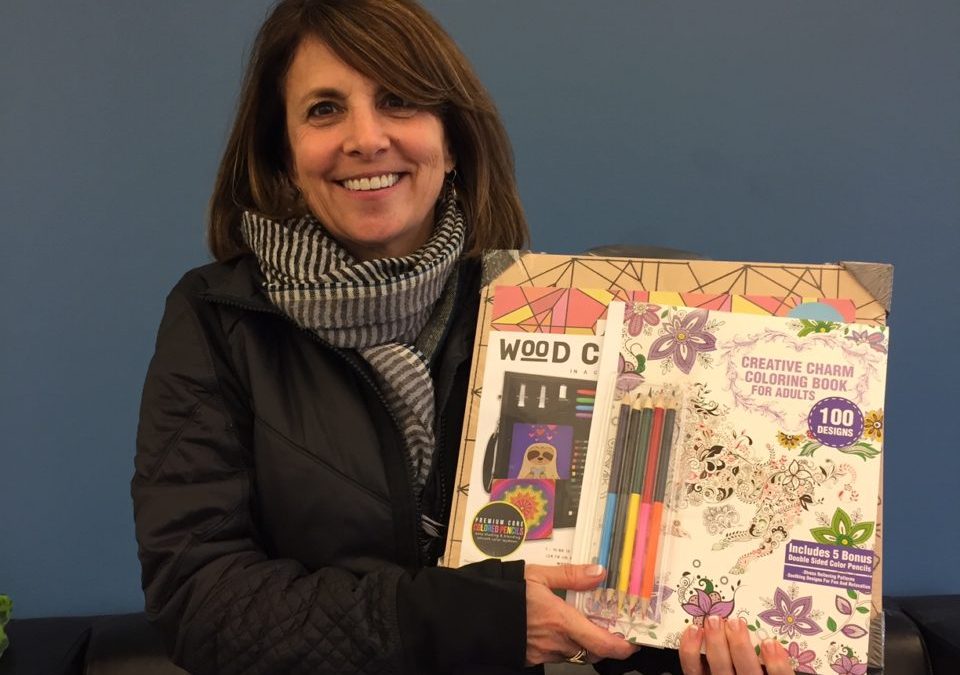
Debbie picks up art activities for her CASA youth, Olivia.*
Helping Youth Overcome Isolation
Debbie has advocated for several CASA children over the years and her persistence and commitment extend now to a teenager named Olivia* who was removed from her home at the age of 12. Olivia’s two younger siblings were removed at the same time and placed together, but Olivia was placed separately with a foster mom who was 78 years old.
Olivia looked forward to Saturday visits with her birth mom and two siblings, but her mother frequently canceled the visits, sometimes without warning. On these occasions, Olivia was unable to see her birth mom, but just as upsetting for Olivia was the loss of time with her younger siblings. When Debbie became Olivia’s CASA volunteer, she intervened to ask that the visits continue whether or not the children’s mother was present, so that the sibling group could stay in touch and remain close.
Debbie was also concerned that Olivia did not receive enough stimulation in her placement. Olivia’s foster mom often complained, “She’s just so bored.” At the same time, her foster mom seemed unaware of any outside activities and was unwilling to drive, particularly in bad weather or in the dark. When Debbie got involved, she connected Olivia to after-school activities that she might enjoy, taught her how to take the bus and accompanied her on her first few bus trips. Debbie also invited Olivia to go to the movies and other weekend activities.
Debbie’s concern about Olivia’s isolation increased when it affected Olivia’s medical care. Because Olivia’s foster mother did not consistently transport her to medical care, Debbie recalls, “She missed so many therapy appointments.”
Then Olivia broke her leg and required surgery. Debbie visited Olivia and noted her lack of mobility. Debbie was concerned that the foster mom did not seem to have a lot of knowledge about Olivia’s condition or follow-up care. The foster mom thought it would be best to keep Olivia home from school for two weeks following her leg injury. Debbie asked the case manager to intervene to ensure that Olivia could attend school during her healing process. Foster children can experience many educational disruptions and Debbie’s strong advocacy gave Olivia one less disruption as she recovered from her injury.
A Setback
Olivia continued to see her younger siblings on Saturday visits. When a Termination of Parental Rights (TPR) seemed likely, the foster parents of Olivia’s two younger siblings indicated their interest in adopting the two children. While happy news for this family, Olivia faced the potential of being left without any family at all.
The case manager asked the couple to consider adopting Olivia as well and arranged an extended visit where Olivia could spend several days with her siblings in their soon-to-be adoptive family. Ultimately the family decided not to adopt the teenaged Olivia, who returned to the elderly foster parent with whom she had been placed.
These extended visits during a decision-making period are important and necessary. However, this “try-out” period feels very much like an audition for a youth who has already experienced the emotional trauma of removal and separation from their birth family. When an extended visit does not result in a long-term relationship, the results can be devastating for the youth who returns to foster care. This was the case for Olivia.
New Hope—with the guidance of CASA
A new case manager was assigned to the case and identified an adoptive family who was specifically interested in adopting a teenager. Knowing how deeply hurt Olivia had been when the “tryout period” with the first adoptive family had not worked out, Debbie approached the situation with sensitivity and caution.
Over a period of weeks, Debbie met with the prospective new family a few times and corresponded with them at length. Debbie recalls that the prospective mom “asked wise and insightful questions.” Debbie and the case manager spent a good deal of time communicating and getting to know the prospective adoptive family before approaching Olivia with the possibility of meeting them.
The prospective family wrote a letter to Olivia introducing themselves and inviting her to come and meet them. They described their family and the events they loved to do, including barbecues, trick-or-treating in the neighborhood, and other holiday celebrations.
However, when Debbie visited Olivia and offered her the letter from the potential family, Olivia resisted. She cried for 30 minutes before even agreeing to read the letter. Because Debbie had established herself as a person Olivia could trust, Olivia did eventually agree to meet the family. When things went well, Olivia’s placement was changed to join her new foster family with the hope of eventual adoption.
Homecoming
Olivia moved to the home of her possibly-adoptive new family, gaining two new parents, three new siblings, and still maintaining contact with her two siblings from her birth family. As with all foster youth, transition periods have both ups and downs, so Olivia’s new prospective parents make sure Olivia attends every therapy appointment. The entire newly-formed family also attends family therapy together. At the request of the new family and with the endorsement of Olivia, Debbie remains highly involved.
Starting a new high school as a freshman, Olivia has gotten to know a lot of new kids. In the fall, Olivia sent Debbie a photograph. Standing in a big group of grinning teenagers was Olivia. She and her friends were all dressed up to attend the Homecoming Dance.
Someone in Her Corner
Debbie played a key role in Olivia’s life during her temporary foster placement and now during her transition to her new family. As Debbie noted, “There had been so much loss in her life and so few consistent people.” Debbie became that consistent person for Olivia during periods of great uncertainty in her life. And Debbie continues to be a trusted advocate for Olivia.
Debbie’s commitment of time allowed her to get to know Olivia at a deep and personal level. It allowed her to understand how Olivia’s past experiences would make it difficult for her to trust and hope in a new family. Debbie’s strong sense of compassion and sensitivity from the beginning of the case through the current moment illustrates the Kids Matter Inc. slogan: “Because every child needs someone in their corner.”
This article was written by Joan Ruffino, a Kids Matter volunteer and writing instructor at UW-Milwaukee.






